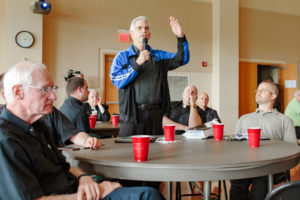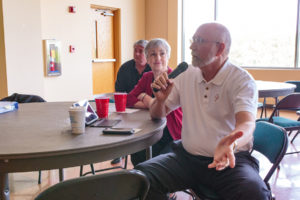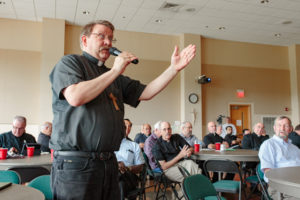Diocese of Knoxville plans to have its own marriage tribunal established within five years
By Bill Brewer

Father Tom Charters, GHM, pastor of St. Michael the Archangel Catholic Mission in Erwin, discusses the annulment process with Father Dexter Brewer of the Diocese of Nashville Tribunal during the case sponsor workshop held April 29 at St. Thomas the Apostle church in Lenoir City. Father Charters is surrounded by diocesan priests, including Father Michael Cummins, Father Jim Haley, CSP, Father Mark Scholz, Father Randy Stice, Father Scott Russell and Father P.J. McGinnity.
The Diocese of Knoxville, which relies on the Diocese of Nashville to decide East Tennessee declarations of nullity, may be establishing its own tribunal that will handle annulment cases.
The Diocese of Nashville Tribunal’s caseload is expanding as Catholic populations in Nashville and Knoxville grow rapidly. And as the Diocese of Knoxville prepares for its 30th anniversary in 2018, a plan needs to be in place for this diocese to shoulder its own caseload, according to Bishop Richard F. Stika.
“Very few dioceses do not have their own tribunal; dioceses much smaller than the Diocese of Knoxville have tribunals,” Bishop Stika said. “I am very grateful to Bishop (David) Choby and the Diocese of Nashville for offering us assistance. We pay a yearly fee for that. But I think if you look at what the fee is and the time factor, because Nashville has its own annulments as well as ours, it can be challenging, especially when you consider people who are in need of healing.”
Tribunals handle a variety of canonical cases within the Church, but it is the requests for declarations of nullity that can be complicated for priests, lay case workers, and those involved in seeking a declaration.
Pope Francis’ recent comments on marriage and family life given in his apostolic exhortation Amoris Laetitia (The Joy of Love) have prompted discussion worldwide about the Church’s approach to family issues such as divorce, remarriage, and annulment and how they relate to the sacraments.
That discussion was continued locally April 29 when the Diocese of Knoxville held a case sponsor workshop for changes relating to new legislation on marriage cases. The workshop was held at St. Thomas the Apostle Church in Lenoir City. Diocesan priests, deacons and laity who handle annulment cases in their parishes took part in the workshop, which was led by Father David Carter, pastor of the Basilica of Sts. Peter and Paul in Chattanooga who also serves as vice chancellor for canonical affairs, and Deacon Sean Smith, Diocese of Knoxville chancellor.
Father Dexter Brewer also addressed the workshop as a representative of the Diocese of Nashville Tribunal, which handles annulment cases for the dioceses of Nashville and Knoxville.
In establishing parameters for the workshop, Father Carter began the session by saying that Jesus is presented as the new Moses in the Gospel of Matthew, and therefore is the new lawgiver. Jesus confirms this in the litany of beatitudes, where it says He came not to abolish the law, but to fulfill it. And instead of dispensing from the law, He came to intensify it.

Deacon Bob Lange asks a question during the case sponsor workshop. He was joined by his wife, Janel. Also at their table is Deacon Sean Smith.
“When the divine master taught about marriage and human relationship in the Sermon on the Mount, he startled his listeners. It startles all of us in every age. Rather than relax the precept against adultery, Jesus dives deeper into the sin and says that even the man who looks lustfully is committing adultery. A few passages later, He will tell us his mind on divorce and remarriage. ‘But I say to you, whoever divorces his wife (unless the marriage is unlawful) causes her to commit adultery, and whoever marries a divorced woman commits adultery,’” Father Carter said, carefully noting the exception Jesus makes, which is “unless the marriage is unlawful.”
Father Carter advised the priests, deacons and lay members that the tribunal is not a function of the mercy of God.
“This seems like a very startling statement to make considering this is the Year of Mercy. However, would declaring a Year of Justice be seen as a denial of God’s mercy? Neither should a Year of Mercy be seen as a denial of God’s justice,” he said.
Father Carter said a passage in the Gospel of Matthew, chapter five, “sums up what we are about in the tribunal.”
“We are here to be faithful to the words of our Lord and Savior, Jesus Christ. We will make the exceptions for unlawful marriage as natural and divine laws indicate. We are also here to help clarify for the faithful the times when we cannot make exceptions and where there is a clear indication to us of the sacrifice that is better to make than to be cast into fiery Gehenna for all eternity. This is the work of justice,” he added.
Father Carter said that in all the talk about mercy, it often is forgotten that justice also is an attribute of God, and an important one if mercy is to have any meaning – “Compassion for the sinner means lifting the sinner up into the way of truth and justice before God. Mercy leads to justification before God; it is not an end in itself.”
He noted that mercy wants to provide knowledge of that truth quickly, and at a time when the Year of Mercy enters into the canonical process, the new norms promote swift justice, justice that should be rendered in a timely manner.
As many people come to the priests, deacons, and lay case workers damaged by the “prevailing winds and mores of a godless culture,” the salvation of souls has to be a main concern. And it has to be balanced by fidelity to the law of the Church, he said before reminding them that “obedience to the law does not mean interpretation of the law.”
The new Church legislation communicated by Pope Francis that will take effect later this year does not attempt to change Church doctrine on the indissolubility of marriage, nor does it attempt to alter the way cases are canonically administered.

Father Steve Pawelk, GHM, pastor of Blessed Teresa of Calcutta Parish in Maynardville and St. John Paul II Catholic Mission in Rutledge, makes a point during the case sponsor workshop on April 29 as priests and deacons listen.
“Rather its express purpose is to present ‘provisions that intend to pursue speedy processes in order not to favor nullity of marriage, but rather to respect the faithful themselves, who have the right to obtain, in a reasonable time, a response to their petition and to obtain justice,” Father Carter said, quoting papal documents.
“To reiterate, this new legislation does not change the substance of the Church’s doctrine nor is it meant to increase the number of affirmative declarations of nullity. Its express purpose is to render a faster decision, affirmative or negative, ‘lest the clouds of doubt overshadow the hearts of the faithful awaiting a decision regarding their state because of a delayed sentence,’” Father Carter continued. “Delayed justice is denied justice. So the purpose, again, is to speed up the process, not to make it easier to get an affirmative decision. There is no right to a declaration of nullity, but there is a right to an answer, yes or no, in a timely manner.”
He told the caseworkers that their efforts are critical to the work of justice in the Church, that they are the bridge between the Church’s pastoral work and her work of justice.
The priests, deacons, and lay caseworkers had many questions, especially for Father Brewer about the procedures for administering annulment cases in a timely manner. Father Brewer told them the Diocese of Nashville Tribunal has to make sure each case is filed accurately, with the correct responses from all parties involved, and that efforts are made to adjudicate the cases as quickly and fairly as possible.
But he noted many cases are delayed because parties in the cases do not respond to required filings in a timely manner.
“As we discuss and delve into this gift of new legislation for the Church, we should always keep in mind the art of accompanying our faithful to the truths embodied in this law. Do not be afraid to proclaim the freedom of the cross. It hurts, and even stings at times, but if we bring people with all humility and all truth to Jesus the gentle judge, they will find the healing we all desperately need,” Father Carter told the group.
According to some reports, those who hoped Pope Francis would give divorced and civilly remarried Catholics a blanket welcome back to Communion and those who feared that he would be opening the doors to such a possibility are both disappointed by his decision.
Pope Francis has made it clear that the sacraments of marriage and of the Eucharist are too sacred to be treated lightly. Without a declaration that a sacramental marriage is null, that marriage by its nature is recognized as indissoluble.
Bishop Stika said the case sponsor workshop was a good way to review the diocese’s procedures and processes in dealing with those who are divorced, especially when they are involved in the annulment process or contemplating annulment.
“With the pope’s recent instructions on how marriage annulments are to be conducted, it’s new, so we brought in Father Carter and people from the tribunal in Nashville to review the new thoughts of the Holy Father and to clear up any misinterpretations. We are looking for clarity in ongoing formation,” Bishop Stika said.
And as the bishop noted, streamlining the process could involve forming an East Tennessee tribunal.
“I’ve had a nice conversation with the priests in our diocese, hearing their questions and offering answers, and I think that’s the general feeling of the priests in the diocese, too. So, we’re looking maybe at establishing a tribunal here in two or three years,” Bishop Stika said.
He said that while forming a diocesan tribunal will have an impact on the diocesan budget in terms of cost, it will be local and more practical, and could improve the procedures surrounding cases.
“An annulment case takes a lot of time, and the pope wants dioceses to consider the time factor. Sometimes too much time makes it even more painful for the people involved. This is one of the ways we can streamline it a bit because it will be local. But again, I am grateful because since our first day as a diocese Nashville has been working with us. Nashville is one of the fastest-growing cities in the United States now, so it [establishing a Diocese of Knoxville tribunal] will have an impact on the Diocese of Nashville itself. Our diocese is growing, too” the bishop said.
“Not only am I looking at how we deal with things in our present age, but also how we will deal with things in the future as we continue to grow. I want to make sure in those areas that we have to begin something, like a tribunal, that we do it in a very systematic and pastoral way,” he added. ■
